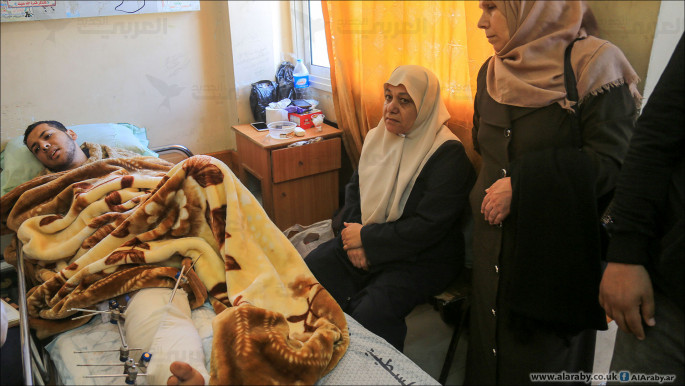Gaza hospital heaves with injured protesters maimed by Israeli forces
The rooms of the al-Shifa Medical Complex, Gaza's largest hospital, are crammed with patients suffering from dozens of different injuries resulting from the Israeli military's brutal response to peaceful marches that began on Friday and coincided with this year’s Land Day.
In addition to the 16 Palestinians killed, more than 1,400 were wounded on Friday, 758 of them by live fire, with the remainder hurt by rubber bullets and tear gas inhalation, the health ministry in Gaza said.
The targeting of the lower areas of the protesters' bodies using explosive bullets have caused deep wounds, and has led to the danger of paralysis and amputation for many.
Twenty-three-year-old Mohammed abu Sama'an, from al-Shati refugee camp, west of Gaza city, was injured as the protests began, when Israeli forces fired at the unarmed protesters.
"I went to the Jahr al-Dik area in Gaza to participate in the rallies with hundreds of young people," he said. "The demonstration was peaceful and did not cross the border, so we were surprised by the shooting of the Israeli soldiers."
The suspected use of explosive bullets has increased protesters’ suffering and worsened their injuries.
"I was hit by a bullet in my feet. I felt something like an electric shock all over my body," Abu Sama’an said. "The soldiers opened fire without any reason," he said, adding that a dozen other young people were wounded in that round of fire.
In the next bed in the hospital lay Mohammed al-Akkad, 15, from the Shajaiya area east of Gaza City, surrounded by his mother and his children. He told The New Arab’s correspondent that he went with his friend to participate in the march and tried to plant the flag of Palestine in the sand.
"The Israeli occupation forces fired at us although we did not cause any harm or danger to the soldiers, as the march was hundreds of meters away from their presence," adding that he was later transferred to Shifa Hospital for treatment.
Mohammed al-Harbawi, a 20-year-old resident of al-Zawaydeh in the central Gaza Strip, had a similar story from the rest of the wounded, being injured while he was around 1,000 kilometeres from the border fence.
"My friends and I went to participate in the march. The Israeli occupation forces shot at us and I was injured in my left foot, but I did not feel it. After a few seconds, I was hit by an explosive bullet that made my body tremble, and I fell to the ground. My feet were bleeding."
Al-Harbawi is awaiting an operation in al-Shifa on his feet. "This Israeli oppression will not deter us from demanding our right to return to our lands," he added.
 |
|
| Palestinians operated on in al-Shiifa hospital (TNA) |
The Israeli forces did not distinguish between the civilians who were protesting to demand the right of return, and the journalists covering the event. "I was 500 meters from the border fence, but the Israeli soldier shot at me, although I was clearly carrying out journalistic work" said Mahmoud Madoukh, a photographer who was wounded while filming the events.
"I noticed the presence of a young man approaching the border fence and correcting an Israeli soldier. I photographed the scene, but I was surprised by the soldier's shooting at me and wounding me," he said.
The head of the emergency department at Al-Shifa Hospital, Dr. Ayman al-Sahbani, said that a state of emergency had been declared in the hospital, and that medical staff had been alerted on Friday to prepare for the arrival of more wounded patients.
Just under 100 operations were carried out at the hospital over the weekend, some requiring many hours and the presence of numerous medical staff.
Israel's military has faced questions from rights groups over its use of live fire on Friday, the bloodiest day in the conflict since a 2014 war, while Palestinians accused soldiers of firing on protesters posing no threat.





 Follow the Middle East's top stories in English at The New Arab on Google News
Follow the Middle East's top stories in English at The New Arab on Google News


